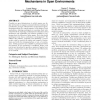156 search results - page 30 / 32 » Homotopy Methods to Compute Equilibria in Game Theory |
CSE
2009
IEEE
14 years 2 months ago
2009
IEEE
—The hidden knowledge in social networks data can be regarded as an important resource for criminal investigations which can help finding the structure and organization of a crim...
ACMICEC
2006
ACM
13 years 11 months ago
2006
ACM
Consider an open infrastructure in which anyone can deploy mechanisms to support automated decision making and coordination amongst self-interested computational agents. Strategyp...
GECCO
2010
Springer
13 years 7 months ago
2010
Springer
This paper takes an economic approach to derive an evolutionary learning model based entirely on the endogenous employment of genetic operators in the service of self-interested a...
EGH
2010
Springer
13 years 5 months ago
2010
Springer
Light maps have long been a popular technique for visually rich real-time rendering in games. They typically contain smooth color gradients which current low bit rate texture comp...
ATAL
2008
Springer
13 years 9 months ago
2008
Springer
In the last few years, argumentation frameworks have been successfully applied to multi agent systems. Recently, argumentation has been used to provide a framework for reasoning a...

